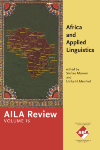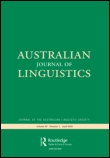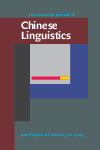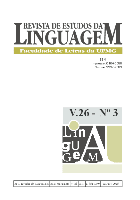
RLA-Revista de Linguistica Teorica y Aplicada
Scope & Guideline
Cultivating interdisciplinary insights in the study of language.
Introduction
Aims and Scopes
- Theoretical Linguistics:
Exploration of linguistic theories and frameworks that underpin language structure, meaning, and use. - Applied Linguistics:
Research focusing on practical applications of linguistic theory in real-world contexts, such as language teaching and communication. - Sociolinguistics:
Examination of language in social contexts, including studies on dialects, language variation, and the impact of social factors on language. - Language Acquisition and Pedagogy:
Research on methods and strategies for teaching languages, including the role of technology and innovative pedagogical approaches. - Computational Linguistics:
Integration of computational techniques in linguistic analysis, reflecting a growing trend towards data-driven research in linguistics.
Trending and Emerging
- Artificial Intelligence in Linguistics:
A burgeoning area of research, this theme encompasses the use of AI tools in lexicography and language teaching, reflecting the integration of technology in linguistic studies. - Ludic Pedagogy:
The incorporation of play-based learning strategies in language acquisition is gaining momentum, emphasizing the importance of engagement and creativity in educational contexts. - Sociolinguistic Variation and Identity:
Increasing attention is being paid to how language reflects and constructs identity, particularly in multilingual and multicultural settings. - Corpus-Based Studies:
The use of corpora for linguistic analysis and teaching is on the rise, showcasing a methodological shift towards data-driven research. - Language and Social Justice:
Research exploring the intersection of language, equity, and social justice is emerging, reflecting broader societal conversations about inclusivity and representation.
Declining or Waning
- Historical Linguistics:
Research in this area has decreased, possibly due to a shift towards more contemporary issues in language use and pedagogy. - Traditional Language Testing:
There appears to be a waning interest in conventional standardized language testing methods, as newer approaches to language assessment gain traction. - Bilingualism Studies:
Though still relevant, studies specifically focused on bilingualism have become less prominent, with a broader focus on multilingualism and language contact taking precedence.
Similar Journals

RUSSIAN LINGUISTICS
Catalyzing collaboration in the global linguistic community.RUSSIAN LINGUISTICS is a peer-reviewed academic journal published by Springer, dedicated to advancing the understanding of the Russian language and its interplay with various linguistic frameworks. With a longstanding history that spans from its inception in 1974, the journal encompasses a broad range of topics within the fields of linguistics and language studies, offering valuable insights especially in *Developmental and Educational Psychology* and the intricacies of linguistics at large. Currently ranked in the Q2 quartile for Linguistics and Language, and holding substantial positions within Scopus rankings, RUSSIAN LINGUISTICS serves as an essential resource for researchers, educators, and students alike, fostering dialogue and collaboration within the international linguistic community. The journal notably provides critical access to research findings that enhance the comprehension of Russian linguistics' role in a global context, despite operating under a traditional access model. For those pursuing scholarly excellence, RUSSIAN LINGUISTICS remains a pivotal platform for disseminating innovative research and promoting the study of language.

AILA Review
Fostering innovative scholarship in language studies.AILA Review, published by John Benjamins Publishing Co, stands as a pivotal resource within the field of linguistics and language studies. With an ISSN of 1461-0213 and an E-ISSN of 1570-5595, this journal is dedicated to fostering innovative research and scholarship that advances the understanding of language in its diverse forms and applications. Spanning significant years from 2003 to 2016 and 2018 to 2024, AILA Review has established itself with a commendable reputation, reflected by its Q2 ranking in Linguistics and Language and notable Scopus rankings, positioning it in the 73rd percentile among Arts and Humanities. As an essential forum for researchers, professionals, and students alike, the journal invites high-quality contributions that engage with theoretical and practical aspects of language acquisition, multilingualism, and applied linguistics, enhancing discourse in these vital areas of study. Although not an open-access journal, its commitment to quality ensures that publications are widely recognized and cited, fostering impactful scholarly exchanges.

Taiwan Journal of Linguistics
Illuminating the Path of Language Acquisition and SociolinguisticsTaiwan Journal of Linguistics, published by CRANE PUBL CO, is a prominent Open Access journal dedicated to the field of linguistics since its inception in 2003. With its ISSN 1729-4649 and E-ISSN 1994-2559, this journal serves as a vital platform for the dissemination of significant research and scholarly discussions from Taiwan and beyond. The journal particularly focuses on advancing knowledge in linguistic theory, language acquisition, phonetics, and sociolinguistics, catering to a diverse academic audience including researchers, professionals, and students. Although it currently holds a Q4 ranking in the Linguistics and Language category, the journal's commitment to quality and accessibility positions it as an emerging resource for those engaged in language studies. Currently ranked #584 in Arts and Humanities and #668 in Social Sciences, it provides critical insights and fosters scholarly exchanges that enhance understanding within the field. The journal's open access model ensures the broadest reach for its published articles, facilitating the global sharing of linguistic research. For more information, visit the journal’s website to explore its latest publications and submission guidelines.

Australian Journal of Linguistics
Elevating Understanding of Language and SocietyThe Australian Journal of Linguistics, published by Routledge Journals, Taylor & Francis Ltd, stands as a distinguished platform in the field of linguistics, fostering rigorous academic discourse since its inception in 1981. With an ISSN of 0726-8602 and an E-ISSN of 1469-2996, the journal has achieved a notable Q2 ranking in the linguistics and language category for 2023, indicating its quality and relevance within the academic community. With a Scopus ranking of #316 in Arts & Humanities and #373 in Social Sciences, it sits in the 71st and 68th percentiles respectively, underscoring its impact in the fields it encompasses. The journal aims to publish high-quality research articles that contribute to the understanding of linguistic theory, sociolinguistics, and applied linguistics, making it an essential resource for researchers, professionals, and students alike. The journal is based in the United Kingdom, at 2-4 Park Square, Milton Park, Abingdon OX14 4RN, Oxon, England, and actively encourages contributions that can expand the current linguistic discourse, reinforcing its commitment to highlighting diverse perspectives in language research.

Colombian Applied Linguistics Journal
Advancing linguistic knowledge for a diverse world.Colombian Applied Linguistics Journal, published by UNIV DISTRITAL FRANCISCO JOSE DE CALDAS, serves as a vital platform for the advancement of knowledge in the field of applied linguistics, particularly within the Latin American context. Since its inception in 2003, the journal has embraced an Open Access model, ensuring that cutting-edge research is readily accessible to scholars, practitioners, and students alike. With a focus on topics including language acquisition, language policy, and bilingual education, the journal contributes to the understanding of linguistic diversity and its practical applications in educational settings. The Colombian Applied Linguistics Journal is dedicated to fostering dialogue and disseminating research that bridges theory and practice, thus playing a crucial role in shaping contemporary discourses in linguistics and education. Located in Bogotá, Colombia, the journal encourages submissions from both national and international authors, enhancing its reputation as a key player in the global linguistic community.

Eurasian Journal of Applied Linguistics
Innovating Language Education Across EurasiaThe Eurasian Journal of Applied Linguistics, published by Hacettepe University, ELT Department, is a distinguished open-access journal that has been contributing to the fields of linguistics and language education since 2015. With a focus on bridging cultural and linguistic understandings across Eurasia, this journal provides a platform for researchers, educators, and practitioners to share cutting-edge studies, innovative pedagogical strategies, and insightful analyses. The journal holds notable Scopus rankings within the Language and Linguistics (Rank #155/1088, 85th Percentile) and Education (Rank #696/1543, 54th Percentile) categories, evidencing its growing impact within the academic community. As it prepares to converge into a new phase from 2018 to 2024, the Eurasian Journal of Applied Linguistics aims to uphold its mission of fostering interdisciplinary dialogue and advancing knowledge in applied linguistics and its related fields.

International Journal of Chinese Linguistics
Unraveling the Complexities of Chinese LanguageInternational Journal of Chinese Linguistics is a distinguished publication that delves into various aspects of linguistic studies pertaining to the Chinese language. Published by John Benjamins Publishing Co, this journal stands out for its commitment to advancing the knowledge and understanding of Chinese linguistics within the global academic community. With an impact factor that places it in the Q2 quartile of linguistics and language, the journal is indexed in prominent databases, achieving ranks of #501 in Arts and Humanities and #580 in Social Sciences. These rankings reflect the journal's dedication to maintaining high scholarly standards and its relevance in both linguistic research and practical applications. While not categorized as Open Access, the journal provides necessary access through institutional subscriptions, thereby ensuring that valuable research reaches a broad audience. Covering a wide range of topics from syntax and phonetics to sociolinguistics and applied linguistics, the International Journal of Chinese Linguistics serves as an essential resource for researchers, professionals, and students seeking to deepen their understanding of the intricate relationship between language and culture in the Chinese context. With converging years from 2019 to 2024, it continues to evolve, reflecting ongoing developments in the field.

Glottometrics
Transforming Linguistic Analysis with Data-Driven ApproachesGlottometrics is an esteemed academic journal dedicated to the intersection of linguistics and quantitative methods, published by the International Quantitative Linguistics Association (IQLA). Based in Germany, this journal serves as a vital platform for researchers and professionals in the fields of linguistics and applied mathematics, fostering the exploration of quantitative approaches to language studies. With its impact factor reflecting its commitment to high-quality research, Glottometrics has established a robust presence in the academic community, as denoted by its categorization in the Q2 quartile in Linguistics and Language and Q4 in Applied Mathematics. While the journal operates on a subscription-based model, it has made significant strides in the ranking hierarchy, securing positions in the 44th to 48th percentiles across various relevant categories in Scopus. Spanning the years 2017 to 2024, Glottometrics invites contributions that harness innovative quantitative methodologies for linguistics research, making it an essential resource for students, researchers, and professionals engaged in the dynamic analysis of language.

Revista de Estudos da Linguagem
Empowering Voices in Linguistic ResearchRevista de Estudos da Linguagem, an esteemed academic journal published by the Universidade Federal de Minas Gerais within its Faculty of Letters, serves as a vital resource for scholars in the fields of linguistics and education. Since its inception in 1992, the journal has embraced an open access model, ensuring that research is accessible to a broader audience, thereby fostering collaboration and knowledge dissemination. Based in Brazil, this journal focuses on a wide array of topics related to language studies, contributing significantly to the discourse within the linguistics community. While recent rankings place it in Q4 in Education and Q3 in Linguistics and Language categories, its dedication to publishing high-quality research continues to attract attention despite its current Scopus rankings. The journal notably ranks at #668 in Language and Linguistics, verifying its emerging impact in the academic landscape. Researchers and students alike will find the journal's commitment to diversity in linguistic research a compelling reason to engage with its articles. The journal's offices are located at AV ANTONIO CARLOS, 6627 PAMPULHA, BELO HORIZONTE, MG, BRAZIL, and it continues to invite contributions that challenge established norms and explore innovative themes within the dynamic realm of language studies.

Forma y Funcion
Exploring the intricacies of language and its functions.Forma y Funcion is a distinguished open access journal published by UNIV NACIONAL COLOMBIA, FAC CIENCIAS HUMANAS, dedicated to advancing the fields of linguistics and language studies. With an ISSN of 0120-338X and an E-ISSN of 2256-5469, the journal has been committed to open access since 2005, ensuring that research is freely accessible to scholars, professionals, and students around the globe. Situated in Bogotá, Colombia, it has established itself as a pivotal platform within the academic community, achieving a commendable Q2 ranking in 2023 in the subfield of Linguistics and Language. Its Scopus rankings further underscore its relevance, placing it in the 55th percentile among peers in the Arts and Humanities and the 51st percentile within Social Sciences. Covering a range of topics related to language and linguistics, Forma y Funcion aims to foster cutting-edge research and dialogue, making significant contributions to the field from 2019 through 2024 and beyond.